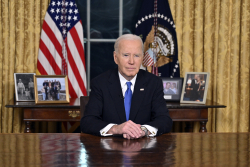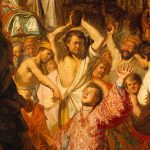In his appearance on Bill Maher’s podcast Club Random, physician and media personality Drew Pinsky described ongoing generational conflicts between older and younger adults: “When we were young, we didn’t want to be ‘The Man.’ It wasn’t cool to be The Man. Our generation [baby boomers] grew up not wanting to be the adult. Now college administrators refuse to be the adult because they remember when they were in college and were demonstrating against their college administrators, and they don’t want to be like them.”
But maybe they should want to be more like the administrators they now are, and less like the students of today.
As author and neuroscientist Iain McGilchrist observes, “In the old days young people went to university to learn from people who were perhaps three times their age and had read an enormous amount. But nowadays they go in order to tell those older people what they should be thinking and what they should be saying.”
Finally, a reason to check your email.
Sign up for our free newsletter today.
A social-class element may be at work here. Growing up in a dusty working-class town in California, I noticed that adults paid little attention to what children thought. Not that this is always a great thing—parents and guardians were often neglectful or totally checked out. School-bus drivers regularly told kids to shut up. Teachers had little time for kids’ interests. One teacher in one of my elementary schools in 2000 knew what Pokémon was—he didn’t pronounce it “Poe-Kee-Man”—and by default, that made him the “cool” teacher.
Many poor kids grow up with negligent parents, but many wealthy kids are overprotected by helicopter parents. Parents in this educated class care too much about what young people think.
For better or worse, the educated class largely molds the culture. I witnessed this firsthand shortly after I was honorably discharged from the U.S. Air Force and went to study as an undergraduate at Yale. I was at a breakfast with some fellow students. Our guest was a former governor and presidential candidate. He was gracious and spent most of his time answering questions from us. His answers were often variations of the same response: “We screwed up, and it’s up to you guys to fix it. I’m so happy to see how bright you all are and how sharp your questions have been because you will fix the mistakes my generation made.” This mystified me. This guy was in his sixties, with a lifetime of unique experience in leadership roles, and he was telling a bunch of 20-year-olds (though I was slightly older) that older adults were relying on them?
In the military, we thought of those senior to us as the leaders. Feedback was encouraged, and commanding officers would regularly consult lower-ranking and enlisted members to see what was working and what could be improved. But that occurred only after getting through the filter of the initial training endeavors.
I remember in the first week of basic training, our instructor declared, “I don’t want any of you [expletive] thinking you are doing anyone a favor being here. I could get rid of all you clowns and have your replacements here within the hour.” (This was 2007, well before the recruitment crisis.) My 17-year-old self heard that and thought: he’s probably right. I thought of the busloads of other ungainly young guys I saw waiting in the endless processing lines.
Then I got to college and learned that, even though any seat—at least at selective schools—can be filled immediately with another bright applicant, students seldom get expelled for showing disrespect to professors, or anyone else. In the military, the first message was: you are a peon, less than nothing, and we can easily replace you (this changes, at least to some degree, as you advance in rank). In college, the first message was: you are amazing and privileged and a future leader (though, for some, also marginalized and erased), and you will never lose your position here among the future ruling class. That feeling of whiplash will forever linger in my mind.
Older people are now reluctant to say that they have accrued some knowledge and have some wisdom to impart. Yet young people have a massive hunger for this wisdom. Part of the reason they behave so erratically, I think, is to test where the line is, and to see what knowledge older people can share to steady their anxieties.
Older adults are also reluctant to exert such authority. They might want the prestige that comes with having power, but they don’t want the responsibility of exerting it when challenged by a bunch of naive and pampered kids who have experienced zero percent of real life and its attendant hardships.

Why should older generations reclaim their authority and leadership? Because everything we know about the brain and behavior shows that they are more responsible, reflective, and stable than the young. In his classic text Envy: A Theory of Social Behaviour, published in 1966, the sociologist Helmut Schoeck observes: “In the United States cases of vandalism involving the children of the middle and upper middle classes are becoming more frequent. . . . [T]he culprits may be turning against too perfect an environment which they did not themselves help to create. They are trying to see how much grown-ups are prepared to stomach.”
In other words, young people act out to see what they can get away with. They want to test boundaries, which older adults are often unwilling to enforce. Many young adults sense this, which often emboldens them. That is, while some young people are implicitly seeking guidance when they act out, others act out because they experience glee when they taunt older adults.
This is, in part, because people generally score the highest on Dark Triad personality traits when they are in their late teens and early twenties. In the realm of personality psychology, the Dark Triad encompasses three interrelated characteristics: psychopathy, characterized by callousness and a profound disregard for others; narcissism, marked by an inflated sense of self-importance and entitlement; and Machiavellianism, which involves strategic exploitation and duplicity for personal gain. The association between age and the Dark Triad is most pronounced for psychopathy, characterized as the “darkest” of the three traits.
By contrast, studies have found that older age coincides with the Light Triad personality traits, which encompass three factors: faith in humanity, reflecting the belief that others are generally good and worthy of trust; Kantianism, denoting the propensity to behave with integrity and honesty; and humanism, which involves a genuine appreciation for the successes of others.
Examples of these differences abound. A study published in the Journal of Business Ethics revealed that younger professionals were significantly more inclined than their older counterparts to endorse ethically questionable behaviors, such as taking company office supplies for personal use or diverting company funds for personal holidays.
Even after controlling for socioeconomic status, younger adults are more likely than older adults to shoplift, commit assault, and drive while drunk, among other crimes. Developmental criminologists have documented an “age-crime curve,” showing a peak in criminal behavior during adolescence and early adulthood that then declines with age. Relative to a 60-year-old man, a 20-year-old man is six times likelier to be arrested for a violent crime.
Beyond overt legal transgressions, younger adults are more deceptive in their everyday lives than older adults. A 2015 study of more than 1,000 individuals aged six to 77 found that young children and elderly adults are the least likely to tell lies, while young adults aged 18–29 were the most likely to engage in deception and also displayed the greatest proficiency at formulating believable lies. A 2021 study found older adults more likely to share positive gossip about other people; younger adults were more prone to spread negative, reputation-damaging gossip.
Older adults consistently rate moral violations more harshly than younger adults, as my own research, completed as part of my doctoral thesis, shows. I analyzed multiple large data sets from the U.S. and more than 90 countries around the world, and found that younger adults deemed actions like tax evasion or theft as more permissible, compared with older adults—an age difference that remained after controlling for income, educational attainment, and political orientation. Strikingly, younger adults also rated physical violence—including political violence, child abuse, and spousal abuse—as more permissible than older adults did.
While perhaps initially surprising, these findings are consistent with research that shows that individuals scoring highly on Dark Triad personality traits tend to condemn moral wrongdoers less harshly. Such traits decline with age, suggesting that, as individuals mature and their personalities become relatively less “dark,” they become more sensitive to moral transgressions.
Research in behavioral economics underscores age-related differences in cooperative behavior, too. Older adults tend to behave in a less self-interested and more altruistic manner than younger adults. A 2012 study analyzed 287 interactions on the popular British game show Golden Balls, in which two strangers play a high-stakes one-shot prisoner’s dilemma–style game to win money. Only 42 percent of contestants younger than age 30 chose to cooperate, compared with 65 percent of contestants older than 50. This reflects greater selfishness and suspicion on the part of younger people.
Similarly, a 2019 survey by Pew Research Center revealed that 71 percent of adults younger than 30 agree that “most people would try to take advantage of you if they got a chance,” compared with just 39 percent of adults over 65. Moreover, adults younger than 30 were twice as likely to agree that “most people can’t be trusted,” compared with adults older than 65.
It’s reasonable to approach any individual study with skepticism. However, in the aggregate, all the research points in the same direction: younger adults display a greater propensity for deceit, manipulation, selfishness, and crime, compared with older people.
Older adults nevertheless crave validation from the youth, which is one reason they are mocked. Young people sense their desire to be seen as cool and deprive them of this by taunting them. This desire for esteem may be why older adults won’t exert any authority in response to energetic young conflict entrepreneurs who regularly yell at them or threaten them.
Near the end of their conversation, Bill Maher responded to Drew Pinsky by stating: “Other cultures figured out that older people are generally wiser. The more days you live, the more things you know. When you’re young you have beauty, and when you’re old you have wisdom.”
If older adults keep chasing validation from the young instead of reclaiming authority in their role as elders, they’ll keep getting mocked—and deservedly so. Wisdom isn’t about being stuck in the past; it’s about offering something steady and timeless in a world that feels increasingly unmoored.
Top Photo: Lindsey Wasson/Getty Images
Source link

















